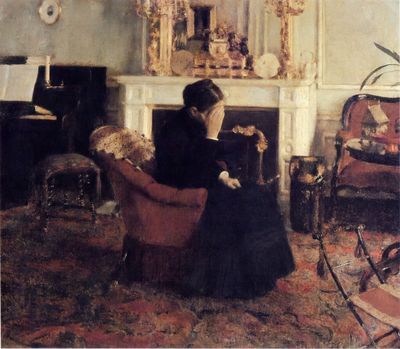Alex Ross's Blog, page 131
January 6, 2015
Bugles of silence
"I could point you to important pieces written for a set of completely voiceless trumpets that I call the bugles of Silence, after the model of the unrecoverable buccins that once overthrew the walls of Jericho. "
— the composer Pouyadou, in Léon Bloy's "Le musicien du silence" (1893)
Previously: Imaginary Concerts.
January 5, 2015
CD of the Week: Andrew Norman's Play
Andrew Norman's Play, recorded here by the Boston Modern Orchestra Project, is a sprawling, engulfing, furiously unpredictable piece in three symphonic movements. (Above is the first, "Level 1.") Will Robin has gone so far as to declare that Play "might be the best orchestral work that the 21st century has seen thus far" — an announcement that spurred a lively Twitter discussion of other candidates for that accolade, with emphasis on purely orchestral works more than half an hour long. I seconded Tim Rutherford-Johnson's nomination of Adès's Totentanz and Czernowin's MAIM, but, having listened to Play at least a dozen times, I won't dismiss Will's suggestion out of hand. I'll have more to say further down the line, particularly when an opportunity arises to hear the music live. At the BMOP site, you can read fine notes by Daniel Stephen Johnson and the composer's own reflections.
Noted
SFJ on D'Angelo: “Black Messiah feels like an object that he held in his hands until it took on a certain physical shape. There seems to be little distance between the players and the music."
January 3, 2015
Listening to Schumann
January 1, 2015
Organ and orchestra, cont.
In the wake of last month's organ column, readers have written in to cite their favorite instruments, players, and repertory. I mentioned Michael Barone's master list of organ-and-orchestra works; he points out how many major pieces depend on an organ part, however limited, and how much is lost when some sort of feeble electronic instrument is substituted. In the column, I named three obvious cases: Mahler's Second and Eighth Symphonies and Strauss's Also sprach Zarathustra. Barone also highlights, among others, Vaughan Williams's Sea Symphony, Ives's Fourth Symphony, Elgar's Enigma, several big Respighi pieces, and Janáček's Glagolitic Mass. (In October, the last-named received an exceptional performance by the Philadelphia Orchestra, with Alan Gilbert conducting.) Barone writes: "Remove the organ from Tchaikovsky’s Manfred, Bartók’s Bluebeard, or Mahler’s Resurrection and you’ve got a flat soufflé." It really is fairly crippling that New York's two big concert halls both lack a proper organ.
There are some lesser-known gems to be found on Barone's list, and orchestras with access to a concert organ should program them more often. A personal favorite is Jón Leifs's Organ Concerto, an astonishingly bold piece completed in 1930. Medieval-sounding chants in parallel fifths, inspired by the old Icelandic practice of tvísöngur (twin-song), collide with pinwheeling triads and brazen dissonances. The core of the concerto is an immense, grittily orchestrated passacaglia of thirty variations. The opening is also very memorable:
From a recording on the BIS label, with En Shao conducting the Iceland Symphony and Björn Steinar Sólbergsson at the organ.
A vote also for Frank Martin's Erasmi monumentum, a 1969 work honoring the quincentennial of Erasmus. Here the organ tends to brood behind and within the orchestra, representing the great Dutch humanist's quizzical relationship with the world around him. There are three movements: "Homo pro se" ("A man unto himself"); "Stultitiae laus" ("In Praise of Folly"); and "Querela pacis" ("The Complaint of Peace"). The middle movement is a freewheeling scherzo in an irregularly dancing triple metre, with the organ cast in vernacular, irreverent guise. Martin was apparently unhappy with the result of his labors, but Erasmi monumentum is not only among his strongest late-period works but one of the most finely controlled, fully realized organ-and-orchestra pieces in the repertory. The YouTube video at the top of this post has Matthias Bamert conducting the London Philharmonic, with Leslie Pearson at the organ; the recording is from Chandos's invaluable Martin cycle.
December 31, 2014
New Walshe, new Dargel
My column in this week's New Yorker makes brief reference to the Irish-born composer-vocalist Jennifer Walshe. Above is an excerpt from Walshe's video-and-live-performance piece The Total Mountain, which was presented at the most recent Donaueschingen Festival, at the invitation of the late and widely lamented Armin Köhler. It's hazardous to generalize about what is going on, but we here see a variety of composer-generated personae vocalizing happenstance tweets: one is fixated on the young males who constitute the pop band One Direction; another is very much concerned with secret incursions of the Illuminati into pop culture; and a third recites lines from the work of Harold Pinter. You can sample more of Walshe's work on the We Are Grúpat YouTube channel — Grúpat being an one-woman art collective in which Walshe assumes nine different alter egos.
I also mention Corey Dargel, whose new album, It's OK It's Not OK, will appear in late January on the New Amsterdam label. The I Care If You Listen blog has a preview of one of the tracks. Dargel's 2009 NewMusicBox essay on "artsongwriters" is an important document of the hard-to-define tendency I discuss in the column. This is the place for a fond reminiscence of the now apparently dormant Professor Heebie McJeebie.
UCLA's Center for the Art of Performance will present Gabriel Kahane's The Ambassador in February.
December 29, 2014
Meredith Monk, Gabriel Kahane
December 23, 2014
'Tis the season...
...for the Messiah on Crack. Via, as ever, The Rambler.
December 22, 2014
No such thing as silence
''The complete absence of any sound does not exist on our planet any more than radical darkness or absolute cold."
— Edmond Bailly, 1889
December 20, 2014
Kozinn turns out the lights
 Like many of my colleagues, I am unhappy to hear that Allan Kozinn, a hugely knowledgeable observer and chronicler of the New York music scene, has been laid off from the New York Times. He had been writing for the paper since the 1970s and became a staff critic in 1991. Will Robin has a compilation of classic Kozinn stories. In the past couple of years, Allan was inexplicably relegated to covering the felonious escapades of pop stars; let's hope that at other publications he will return to the classical beat he knows so well. I can do no better than to quote Jeremy Eichler: "Superb critic, treasured colleague, extraordinary mensch."
Like many of my colleagues, I am unhappy to hear that Allan Kozinn, a hugely knowledgeable observer and chronicler of the New York music scene, has been laid off from the New York Times. He had been writing for the paper since the 1970s and became a staff critic in 1991. Will Robin has a compilation of classic Kozinn stories. In the past couple of years, Allan was inexplicably relegated to covering the felonious escapades of pop stars; let's hope that at other publications he will return to the classical beat he knows so well. I can do no better than to quote Jeremy Eichler: "Superb critic, treasured colleague, extraordinary mensch."
Alex Ross's Blog
- Alex Ross's profile
- 425 followers




